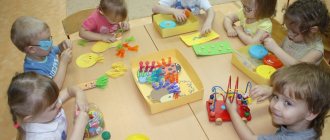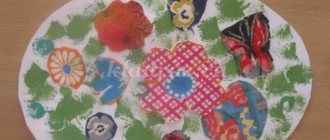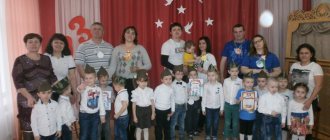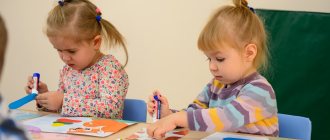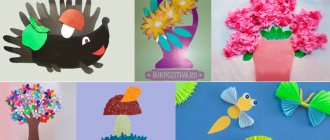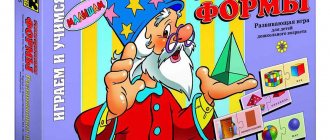Speech development in the middle group of preschool educational institutions
The development of communication and speech skills, which includes enriching vocabulary and developing clear pronunciation, is considered one of the main tasks for preschoolers.
Speech development lesson
Note! For the correct speech development of children in the middle group, educators do a tremendous amount of work. It is based on a set of special exercises and methodological techniques aimed at improving speech skills and developing a high culture and politeness of speech.
To develop speech in the middle group of preschool educational institutions, various directions are used:
- children’s knowledge and ideas about surrounding objects deepen;
- children become familiar with the details and names of parts of things;
- words denoting the properties of objects and phenomena are studied;
- vocabulary in the field of professions is replenished;
- words that denote relationships between people are studied;
- children learn to express their own thoughts in complex sentences that are grammatically correct.
To solve the assigned tasks in the middle group, the teacher must take a responsible approach to the process and purposefully conduct classes.
Federal State Educational Standards requirements for speech development
All educational institutions, regardless of whether they are public or private, must focus on certain program requirements that are specified in the Federal State Educational Standard.
As for the speech development of preschoolers, the requirements are as follows:
- Vocabulary must be constantly enriched;
- the child must have speech skills in accordance with age;
- the sound and intonation range of speech expressiveness should expand;
- develop the ability to perceive sounds by ear and at the same time hear, identify and, if there are errors, correct them;
- develop the ability to listen and remember the storyline;
- develop logically consistent and meaningful speech;
- skills of retelling and acting out dialogues;
- the child must learn to convey the meaning emotionally and read a poem by heart with expressiveness;
- work should be carried out to expand the horizons of preschoolers about objects, properties, phenomena and the concept of a coordinate system;
- generalizing concepts are introduced into the lexicon;
- training is provided to improve the grammatical construction of sentences.
Note! All training sessions should be conducted by the teacher so that they simultaneously include solving assigned problems and game moments. Only in this case will it be possible to interest children and achieve the desired results.
Directions of speech development (FSES DO)
Age-related psychological characteristics of children in the middle group of preschool educational institutions
In terms of development, middle preschool age is a continuation of early childhood. During this period, children master the world of permanent things, master the culture of speech, and the formation and development of psychological perception also occurs.
In middle age, children continue to actively develop speech, substitution ability, thinking and imagination. With the help of speech, middle group students express their emotions and share their impressions.
Note! There is a rapid development of memorizing information and retaining it in memory, and the ability to concentrate is also enhanced.
As a rule, at this age, kindergarten teachers conduct special planned classes on speech development. They are provided for by special educational standards. But, despite this, pedagogical work in this direction is not limited to a certain framework. The most important thing is that when selecting tools, the teacher must take into account all the age characteristics of his students.
Using the fairy tale format for the development of speech in preschoolers
Methodological tools
Within the framework of the requirements of speech development, the teacher faces serious tasks that force him to approach the process thoughtfully, responsibly and in accordance with certain standards.
Basic pedagogical techniques
Each lesson on speech development in the middle group should be based on a specific pedagogical technique. Currently, three main groups of speech development techniques in preschool institutions have been identified. These are verbal, visual and playful techniques.
Their essence is as follows:
- Teaching stories using story pictures.
- Daily reading of fiction, which is provided for in the educational program.
- Carrying out work with children in a conversation format.
- Application of gaming technologies.
- Systematic and unobtrusive repetition of a new word.
- Motivation to complete the curriculum.
Note! In addition to implementing the pedagogical techniques listed above, the teacher must organize physical education sessions for students. They are also part of the curriculum and help to develop a serious attitude towards physical education in children.
Games for speech development
By the age of five, children should learn to pronounce all sounds correctly. You can achieve your goal through daily breathing exercises.
Didactic games on “Speech Development”
You can form grammatically correct speech thanks to games and exercises:
- "More less".
- “Call me kindly.”
- “Whose toy?”
- “Continue the sentence.”
- "Which".
Speech corner equipment
In order to stimulate independence and informal playful communication with children, in accordance with the requirements of the Federal State Educational Standard, an aesthetically attractive, comfortable and special subject-development environment must be created in which children will not be afraid, but rather feel at ease and at ease.
Important! It is best to place the speech corner away from the playing area in a well-lit place. It must be equipped with didactic and visual aids, as well as the necessary materials that are used by the teacher during classes.
Speech corner
Table: filling out the speech corner by section
| Chapter | Content |
| Certificate | Schemes of words, sentences and corresponding games (“Add a word”, “Choose a word”), puzzles and crosswords. |
| Connected speech | Subject pictures, “Playing in the profession”, “Guess by the description”. |
| Grammar | Games “Name it affectionately”, “One-many”. |
| Vocabulary | Pictures, lotto, puzzles. |
| Sound pronunciation | Game exercises, games to automate sounds. |
| Breath | Pipes, bubbles, balloons for inflation. |
| Fine motor skills | Pencils, puzzles, mosaics, tops. |
| Phonetic hearing | Sound differentiation games. |
| Articulation gymnastics | Pictures, sets of exercises, methodological literature. |
| Higher mental functions | Dominoes, cut pictures. |
Note! Among other things, experts recommend having Ushakova’s book “Speech Development” in the speech corner. It examines in detail all the problems of speech development for children in the middle group, selects methodological recommendations and compiles lesson notes.
Distance education
Planning work on ZKR in the middle group (children 4-5 years old)
- Main areas of work:
- Formation of correct pronunciation
- Development of auditory perception, phonemic hearing
- Development of prolonged oral exhalation, speech breathing
- Work on intonation expressiveness of speech (voice height and strength, word stress, diction development)
- Development of fine motor skills
- Working on the morphological drawing of a word
- Recommendations for planning work on ZKR:
- As an element of speech development in educational areas, it is carried out at least 2 times a week
- In the calendar plan, work on the development of the respiratory system (breathing, auditory attention, intonation) is taken into account daily
- Fine motor skills are also developed daily
- Individual work must be reflected in planning
Didactic games and exercises:
- Games for the formation of correct pronunciation of sounds - 7c, pp. 54-95, speech therapy lotto, dominoes,
- “Magic cubes” (for onomatopoeia and articulation),
- "Magic bag"
- "Sound clock"
- “Fishing” (7g, p. 28),
- "Logical Train"
- “Who will pack their things faster?” (7d, p. 49),
- “Pick up a bouquet” (7d, p.52),
- “Find a Pair” (7d, p.53),
- “Shop” (7d, p. 50), “Train” (7d, p. 61),
- “Find a place for the picture” (7d, p.29),
- “Magic Wand” (7l, p.24),
- “Whose story is better?” (7c, p.99),
- “Let’s go for a ride in the car” (7b, p. 27), “Name the products” (76, p. 141),
- “Guess the last word” (addition of poems, phrases - 7e p. 59),
- “Who will see more?” (finding words with a given sound in the picture),
- “Who is more faithful and faster?” (you can work similarly with any sounds) (7e, p.30),
- “Who will remember more?” (selection of any words - all parts of speech - with a given sound),
- “Who will hear more?” (selecting words with a given sound from a listened text), making sentences based on plot pictures, stories based on a series of pictures, staging fairy tales.
- Games and play exercises used to develop general speech skills:
- Development of auditory attention, speech and phonemic hearing:
It is necessary to have sounding toys and music in the group. instruments (hammers, bells, metallophone, tambourine, pipes, drum, rattles...) Work on reproducing a series of sounds. Practice the ability to reproduce a series of sounds at different tempos.
Didactic games for the development of auditory attention:
- “Repeat after me” (“Parrot”, “Tape Recorder”),
- “Seller and buyer” (7d, p. 16),
- “Telephone” (7 l, pp. 89,94),
- “Who heard what?” (7g, p.15,16),
- “Who called?” (7g, p.22),
- “Where does it sound?” (7g, from 15),
- “Blind Man’s Bluff” (with sounding objects, with a voice - 7g, p. 18),
- "Whose voice?" (birds and animals - 7g, p. 21),
- “Who hears better?” (7 l., p. 89), “Echo” (7 l., p. 89),
- “Commotion”, “Wind and Birds”, (“Sun and Rain” - 7g, p. 19,20),
- “Snail” (7d, p.22),
- “Frog” (7d, p.22),
- “Find the mistake” (7b, p.25), poems, fables...
Didactic games for the development of phonemic hearing:
- “What sound does your name begin with?”
- “Find the mistake and say the word correctly” (76, p. 151),
- “Rhymes” (desktop-printed and oral version),
- “Damaged phone”, “Highlight with voice” (the child pronounces a word with the voice highlighting a given sound - zzzzayka, kozza,...) + d/i from point No. 3
- Development of the articulatory apparatus:
Required:
- cards of games and exercises for articulatory gymnastics (7c p. 32-39, 7e, 7d, 7m p. 125)
- fairy tales about the “Merry Tongue” (7l pp. 31,53,79,111; 7d;…)
- material containing a description of the structure of the organs of articulation when pronouncing the sounds being studied (7i, 7e)
- Development of long exhalation, speech breathing:
The group should have games and play material for the development of long-term smooth exhalation (tissue paper aids, leaves, snowflakes, pendant toys, pinwheels, light blowing toys, inflatable toys, balloons, soap bubbles, pieces of cotton wool, pipes,...) It is necessary to make a card index of games and breathing exercises.
Didactic games for developing long exhalation:
- “Footballers”, “Whose snowflake... will fly next?” (7g, p.40),
- “Pump”, “Lumberjacks”, “Whose steamer hums better?” (7g, p. 40),
- “Recognize by smell” (any aromas - 7g, p. 40),
- “King of the Winds”, “Gurgling” (blowing into water through a straw), “Who is stronger?” (to blow off a light scarf... - 7 l, p87),
- "Bubble." (differentiation S - Ш - 7g, p. 42),
- “Blizzard” (“Beep” - 7g, p. 51)
Didactic games for the development of speech breathing:
- “Come up with a phrase” (7d, e.44),
- “Name your neighbors” (7d, p.44),
- “Echo” (repeat the phrase in 3-5 words),
- “The Magic Mirror” (7d, p.45),
- “Locate the place of the toy” (7d, p.49),
- "Who will win?" (7d, p.52)
- Work on the expressiveness of speech: (tempo, rhythm, verbal and logical stress, diction...):
Practicing the pronunciation of tongue twisters, tongue twisters, poetry (Select words with a complex syllable structure).
Dramatization games (“Three Bears”, “Wolf and Seven Little Goats”, “Bear and Christmas Tree” - 7v pp. 53,54).
Round dance games, role-playing games (“Guests”, “Bus”, “Mail”, “Telephone”,...). “Say a phrase with ... mood”, “Isolate a word in a phrase with your voice”, “Your mood”, “Cat and mice” (children are forced to speak slowly), “Blizzard” (7d, p. 51), “Dashes” (7c .51), “Guess which train” (7b p.36)
- Development of fine motor skills:
The group must have:
- card index of finger games, speech with movement
- various mosaics with small details, construction sets, large beads, ...
- aids for fastening buttons, lacing
- tutorials for shading, stencils, labyrinths, stamps, “Lay out a pattern from sticks”, ...
Didactic games for the development of fine motor skills:
- “Piano”, “Magic bag”, “Find a pair” (buttons or other paired small items),
- “Dry finger pool” (7i, p. 74),
- “Clothespins” (7i, p.67),
- “Make a chain (paper clips)”, “Finger theatre”, “Shadow theatre”, “Forfeits”, “Drawing with scissors” (7i, pp. 69,75),
- “Embroiderers” (7i, p. 70),
- “Find a surprise” (7i, p.66),
- “The Little Pharmacist” (7i, p.69),
- “Colored drops” (7i, p.68),
- “Roll up a ball”, “Motley rug”
- Organization of the ZKR corner:
- For the corner it is necessary to allocate a specific place where the following should be collected:
- systematized speech and visual material
- card files of games and exercises. for the development of fine motor skills
- card files of games and exercises. on the development of breathing
- card files of articulation exercises
- card files of games and exercises. on the development of breathing
- card files of games and exercises. on the development of auditory and speech attention
- card file of speech material for working with studied sounds
- Material for the development of fine motor skills should be accessible to children (except for very small parts)
- The corner is replenished monthly:
- speech and visual material according to plan
- material for the development of general speech skills and fine motor skills according to these recommendations at the discretion of the teacher
- any training session for working with sounds (one) and for developing general speech skills (one)
- Recommended reading:
- A. Efimenkova L.I. “Speech Formation in Preschool Children”
- b. Maksakov A.I. “Is your child speaking correctly?”
- V. Maksakov A.I., Tumakova G.A. "Learn by playing"
- Ed. Seliverstov V.I. “Games in speech therapy work with children”
- D. Shvaiko G.S. “Games and play exercises for speech development”
- E. Aksenova A.K., Yakubovskaya E.V. “D/i in Russian language lessons in grades 1-4. aux. school."
- and. “Tru-la-la” from the series “Karapuz”
- h. Budennaya T.V. “Speech therapy gymnastics”
- And. Galanov A.S. “Mental and physical development of a child from 3 to 5 years old”
- K. Borodich A.M. “Methods for the development of children’s speech”
- l. Khvattsev M.E. “Speech therapy work with preschool children”
- m. Ed. Ushakova O.S. “Speech development classes in the Danish garden”
- n. Gerbova V.V. “Classes on speech development in the senior group”
Speech therapist teacher
E. S. Mikushina , highest qualification category
| Methodical piggy bank |
Lesson on speech development in the middle group
Planning lessons should be carried out according to methodological recommendations.
Lessons on fairy tales
Lesson structure
Each lesson should be conducted according to a specific scheme:
- The organizational introductory part is characterized by a motivating and stimulating nature. The main task of the teacher at this stage is to get the children into the mood for work and awaken their interest in the topic.
- Practical part - the teacher sets the tasks and explains the essence of the task.
- Active work - children complete tasks in conjunction with a verbal assessment of the students’ activities.
- Summing up - the teacher’s goal is to draw children’s attention to the result.
Articulation gymnastics for the sound R

